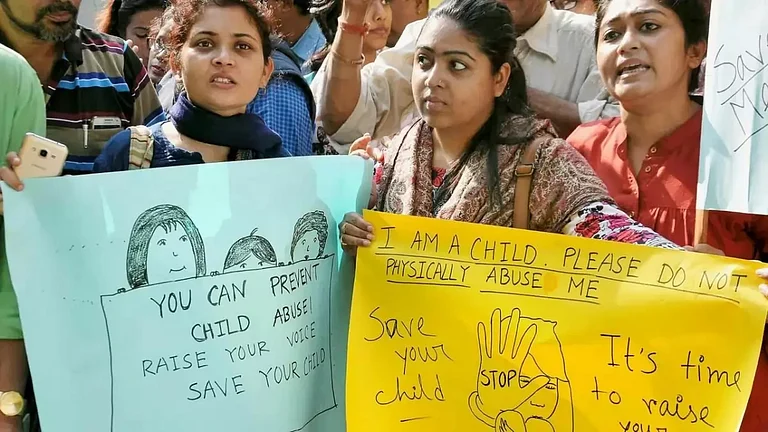The Supreme Court in a landmark verdict held that watching and downloading child pornography are offences under the Protection of Children from Sexual Offences Act and the information technology law. While also suggesting to stop using the term 'child pornography' and highlight exploitation of children in the term itself.
'Watching, Downloading Child Pornography Are Offences': Key SC Order On Child Porn Laws In Detail
A plea challenging the Madras High Court order which said watching child pornography was not an offence and suggesting society to be 'mature' enough was heard by Supreme Court today.

A plea challenging the Madras High Court order which said watching child pornography was not an offence and suggesting society to be 'mature' enough was heard by Supreme Court today. The apex court had earlier called this ruling 'atrocious' and agreed for the hearing today.
What Did Supreme Court Say On 'Child Pornography'?
The Supreme Court bench headed by Chief Justice D Y Chandrachud and comprising Justices J B Pardiwala and Manoj Misra, made some notable changes to the Protection of Children from Sexual Offences (POCSO) Act and Information Technology (IT) Act regarding the guidelines on child pornography and how to prevent exploitation of children.
"We have said about lingering impact of child pornography on victimisation and abuse of children and on role to report an offence, including role of society and stakeholders," the bench said.
"We have suggested to Parliament to bring an amendment to POCSO... so that definition of child pornography can be referred to as 'child sexually abusive and exploitative material'. We have suggested an Ordinance can be brought in," it added.
According to Supreme Court verdict -
Watching and downloading child pornography are offences under the POCSO Act and IT Act.
The term "child sexually abusive and exploitative material" to be used instead of 'child pornography'.
A person who opened a child pornographic link without knowledge will be liable on failure to report to authorities.
"Any form of intangible or constructive possession of any child pornographic material will also amount to “possession” under Section 15 of the POCSO in terms of the Doctrine of Constructive Possession", said SC bench.
Certain guidelines to be followed on child pornography and the bench laid its legal consequences.
What Was Madras High Court Order All About?
The Madras High Court on January 11 quashed the criminal proceedings against a 28-year-old man who was charged with downloading pornographic content involving children on his mobile phone.
While pronouncing the verdict, the apex court restored the criminal proceedings in the case saying the high court had erred in quashing it.
The bench said the sessions court will now deal with the case afresh.
The high court had also said that children these days were grappling with the serious issue of watching pornography and instead of punishing them, the society must be "mature enough" to educate them.
The high court had quashed the criminal case against S Harish under the POCSO Act, 2012 and IT Act, 2000.
In order to constitute an offence under section 67B of the IT Act, an accused must have published, transmitted or created material depicting children in a sexually-explicit act or conduct, it had said.
"A careful reading of this provision does not make watching child pornography, per se, an offence under section 67B of the Information Technology Act, 2000," the high court had added.
Even though the said section of the IT Act has been widely worded, it does not cover a case where a person has merely downloaded child pornography in an electronic gadget and watched the same, without doing anything more, it had said.
Admittedly, two videos involving boys were downloaded and were available on the petitioner's mobile phone, and those were neither published nor transmitted to others and were within the petitioner's private domain, it had said.
The Madras High Court had, however, expressed concern over children watching pornography.
Viewing pornography can have negative consequences on teenagers down the line, affecting both their psychological and physical well-being, it had said.
The high court had advised the petitioner to attend counselling if he was still afflicted with the addiction of watching pornography.
Petitioners Challenging Masdras HC Ruling
The Supreme Court had taken note of the submissions made in the matter by senior advocate H S Phoolka, who represented two petitioner organisations, that the high court verdict was contrary to the laws in this regard.
The senior lawyer appeared in the court on Monday on behalf of NGOs Just Rights for Children Alliance, based in Faridabad, and the New Delhi-based Bachpan Bachao Andolan. The organisations work for the welfare of children.
- Previous Story
 Elections 2024: Ashok Tanwar Joins Congress Again; Sehwag Endorses Congress Candidate In Haryana
Elections 2024: Ashok Tanwar Joins Congress Again; Sehwag Endorses Congress Candidate In Haryana - Next Story



























